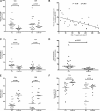Idiopathic CD4+ lymphocytopenia: natural history and prognostic factors
- PMID: 18456875
- PMCID: PMC2442741
- DOI: 10.1182/blood-2007-12-127878
Idiopathic CD4+ lymphocytopenia: natural history and prognostic factors
Erratum in
- Blood. 2014 Jul 17;124(3):463. Kovacs, Stephen J [corrected to Kovacs, Stephen B]
Abstract
Idiopathic CD4(+) lymphocytopenia (ICL) is a rare non-HIV-related syndrome with unclear natural history and prognosis. This prospective natural history cohort study describes the clinical course, CD4 T lymphocyte kinetics, outcome, and prognostic factors of ICL. Thirty-nine patients (17 men, 22 women) 25 to 85 years old with ICL were evaluated between 1992 and 2006, and 36 were followed for a median of 49.5 months. Cryptococcal and nontuberculous mycobacterial infections were the major presenting opportunistic infections. Seven patients presented with no infection. In 32, CD4 T-cell counts remained less than 300/mm(3) throughout the study period and in 7 normalized after an average of 31 months. Overall, 15 (41.6%) developed an opportunistic infection in follow-up, 5 (13.8%) of which were "AIDS-defining clinical conditions," and 4 (11.1%) developed autoimmune diseases. Seven patients died, 4 from ICL-related opportunistic infections, within 42 months after diagnosis. Immunologic analyses revealed increased activation and turnover in CD4 but not CD8 T lymphocytes. CD8 T lymphocytopenia (< 180/mm(3)) and the degree of CD4 T cell activation (measured by HLA-DR expression) at presentation were associated with adverse outcome (opportunistic infection-related death; P = .003 and .02, respectively).
Trial registration: ClinicalTrials.gov NCT00001319.
Figures




References
-
- Anonymous. Unexplained CD4+ T-lymphocyte de-pletion in persons without evident HIV infection–United States. MMWR Morb Mortal Wkly Rep. 1992;41:541–545. - PubMed
-
- Duncan RA, von Reyn CF, Alliegro GM, Toossi Z, Sugar AM, Levitz SM. Idiopathic CD4+ T-lymphocytopenia: four patients with opportunistic infections and no evidence of HIV infection. N Engl J Med. 1993;328:393–398. - PubMed
-
- Ho DD, Cao Y, Zhu T, et al. Idiopathic CD4+ T-lymphocytopenia: immunodeficiency without evidence of HIV infection. N Engl J Med. 1993;328:380–385. - PubMed
-
- Smith DK, Neal JJ, Holmberg SD. Unexplained opportunistic infections and CD4+ T-lymphocytopenia without HIV infection: an investigation of cases in the United States. The Centers for Disease Control Idiopathic CD4+ T-lymphocytopenia Task Force. N Engl J Med. 1993;328:373–379. - PubMed
-
- Spira TJ, Jones BM, Nicholson JK, et al. Idiopathic CD4+ T-lymphocytopenia: an analysis of five patients with unexplained opportunistic infections. N Engl J Med. 1993;328:386–392. - PubMed
Publication types
MeSH terms
Associated data
Grants and funding
LinkOut - more resources
Full Text Sources
Other Literature Sources
Medical
Research Materials

